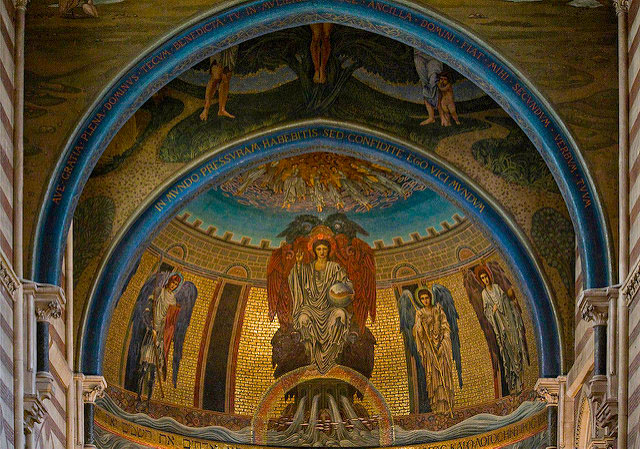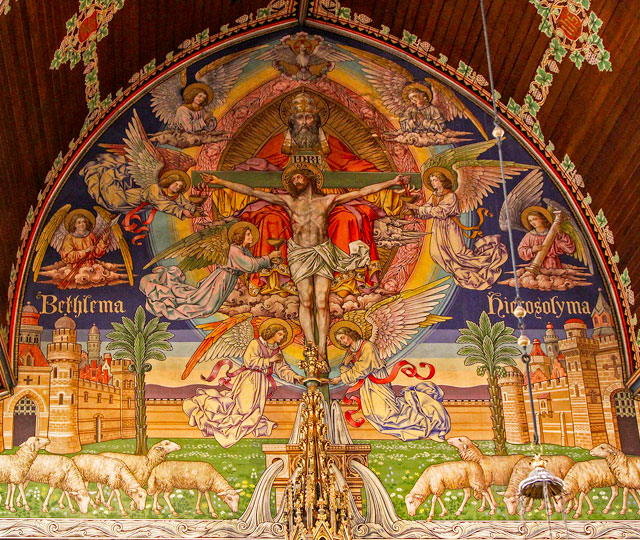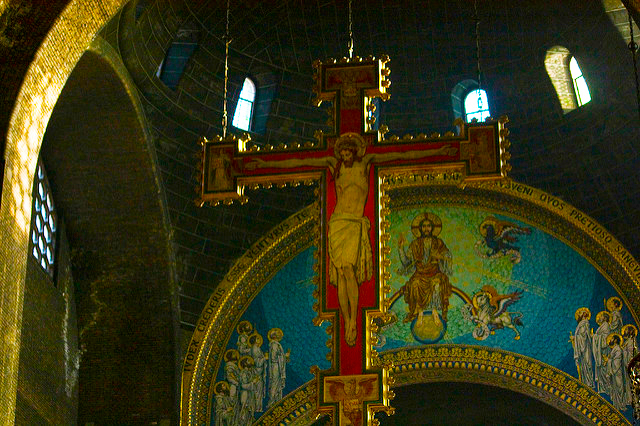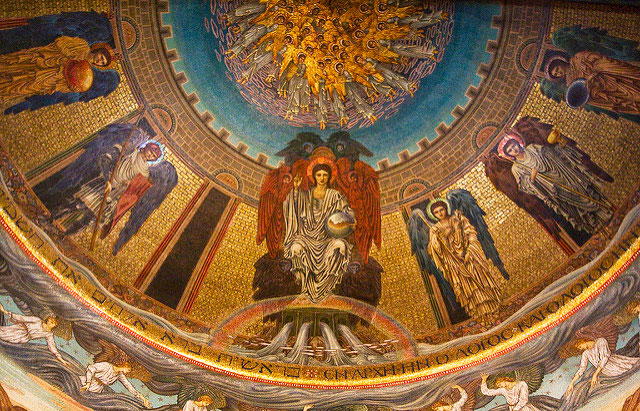“Weeping and gnashing of teeth” is a phrase often associated with “hell” in the popular religious imagination. It is found seven times in the New Testament, six of those in the book of Matthew, but all of them from the mouth of Jesus. What does this phrase mean? And does it really have anything to do with hell?
- But the subjects of the kingdom will be thrown outside, into the darkness, where there will be weeping and gnashing of teeth. (Matthew 8:12)
- They will throw them into the blazing furnace, where there will be weeping and gnashing of teeth. (Matthew 13:42)
- And throw them into the blazing furnace, where there will be weeping and gnashing of teeth. (Matthew 13:50)
- Then the king told the attendants, “Tie him hand and foot, and throw him outside, into the darkness, where there will be weeping and gnashing of teeth.” (Matthew 22:13)
- He will cut him to pieces and assign him a place with the hypocrites, where there will be weeping and gnashing of teeth. (Matthew 24:51)
- And throw that worthless servant outside, into the darkness, where there will be weeping and gnashing of teeth. (Matthew 24:51)
- There will be weeping there, and gnashing of teeth, when you see Abraham, Isaac and Jacob and all the prophets in the kingdom of God, but you yourselves thrown out. (Luke 13:28)
Weeping and Gnashing
What do these words mean, and what does this phrase indicate? Let’s look first at the “gnashing” of teeth. The Greek noun is
brugmos; the verb form is
brucho, to “gnash.” There are several instances of these words found in the LXX (the Septuagint, ancient Greek translation of the Old Testament). It is not used to indicate remorse, or the suffering of torment, or the pangs of hell but is a symbol of anger and often depicts snarling or growling.
- “God assails me and tears me in his anger and gnashes [brucho] his teeth at me; my opponent fastens on me his piercing eyes.” (Job 16:9)
- “But when I stumbled, they gathered in glee; assailants gathered against me without my knowledge. They slandered me without ceasing. Like the ungodly they maliciously mocked; they gnashed [brucho] their teeth at me.” (Psalm 35:15-16)
- “The wicked plot against the righteous and gnash [brucho] their teeth at them.” (Psalm 37:12)
- A king’s wrath is like the growling [brugmos] of a lion.” (Proverbs 19:12)
- “The wicked will see and be vexed, they will gnash [brucho] their teeth and waste away; the longings of the wicked will come to nothing.” (Psalm 112:10)
- “All your enemies open their mouths wide against you; they scoff and gnash [brucho] their teeth and say, ‘We have swallowed her up. This is the day we have waited for; we have lived to see it.’” (Lamentations 2:16)
In none of these verses does the use of
brucho or
brugmos indicate remorse. They all indicate anger.
In the New Testament, in addition to Jesus’ use in the Gospel, we find the verb
brucho in Acts 7:54, where it indicates the anger of the Jews at Stephen’s preaching, just before they stone him. “When they heard these things they were cut to the heart, and they gnashed [
brucho] at him with their teeth.” Here it is used very literally but still as an expression of intense anger.
The word Greek word for “weeping,”
klauthmos, can certainly mean remorse, as it does in a few instances in the LXX. But more often than not, it indicates a lament that is not about remorse. Remorse is regret about one’s own action, but lament is about loss or calamity that has befallen. It is not the silent weeping of one bravely holding back tears; it is the dramatic wailing of one who has suffered great loss.
But what is the cause of the angry lamentation and seething rage we find in the New Testament examples? Is it loss of heaven or consignment to eternal perdition? No, it is something very different and close to hand. It does not depict a post-mortem, other-worldly condition but a now ancient event. It is not about
hades, the realm of the dead, but about
gehenna, an historical judgment. In every instance, this “weeping and gnashing of teeth” has to do with the kingdom of God.
The Kingdom of God
The burden of Jesus’ preaching ministry in Matthew was that the kingdom of God had now come into the world. His parables were all about the kingdom, and his miracles were a manifestation of the presence and power of the kingdom. His Sermon on the Mount was, from beginning to end, about the kingdom.
Toward the end of his Sermon, Jesus warned, “Enter through the narrow gate. For wide is the gate and broad is the road that leads to destruction, and many enter through it. But small is the gate and narrow the road that leads to life, and only a few find it” (Matthew 7:13-14). Remember that he was addressing Jewish listeners and was particularly critical of the Pharisees. There was a “narrow” way that led to life — which in context of the kingdom of God would be participation in the kingdom — and few would find it.
But there was also a “broad” way that was headed for destruction, and many would follow that path. Understand, also, that the “many” and the “few” of whom he was speaking was particularly in reference to the Jews. For just a handful of verses later he speaks of those who find the kingdom, and this is where we find the first reference to “weeping and gnashing.”
I say to you that many will come from the east and the west, and will take their places at the feast with Abraham, Isaac and Jacob in the kingdom of heaven. But the subjects of the kingdom will be thrown outside, into the darkness, where there will be weeping and gnashing of teeth. (Matthew 8:11-12)
Notice
that there will be many, not few, who come into the kingdom. They come from east and from west. They are not of Israel or Judea. They are not Jewish but Gentile, which is to say that they are from the surrounding pagan nations.
Many of these would come and take their place at table in the kingdom of God.
But what of the many Jews who followed the broad way to destruction? They were the natural subjects of the kingdom and to whom all the promises belonged? They would be thrown out. They would not have any part in the kingdom that should have been theirs. These are the same who, in Jesus’ parables, are thrown into the “blazing furnace” (Matthew 13:42, 50), thrown outside, “into the darkness” (Matthew 22:13; 25:30), and assigned “a place with the hypocrites” (Matthew 24:51). In each instance, they are enraged, wailing and seething in anger.
The End of the Age
This “weeping and gnashing,” Jesus said, would occur at “the end of the age.” In Matthew 24, Jesus tells us about when that would be. He had just been in the temple, where he had pronounced a series of “woes” to the Scribes and Pharisees. He wept over Jerusalem, whom he had longed to gather under his protection — but they refused. And he foresaw what they were unable or unwilling to see: “Your house will be left to you desolate” (Matthew 23:37-39).
As he departed from the temple, the disciples came marveling about the immensity and grandeur of the temple complex. But Jesus answered, “Truly I tell you, not one stone here will be left on another; every one will be thrown down.”
The disciples were curious. Confused. Concerned. They came to him later, on the Mount of Olives, and asked him about it. “When will this happen, and what will be the sign of your coming and of the end of the age?” They were not asking him about three different things but about one thing three different ways. They wanted to know when the temple would be destroyed. This, for the Jews, would be tantamount to the end of the world. But the disciples were now associating it with the sign of Christ coming in the glory and power of his kingdom. The end of their present age would mark the beginning of the new age of the kingdom.
The rest of Matthew 24 is Jesus’ answer to their question. Both the city of Jerusalem and the temple were to experience terrible destruction, as would all who were in them. It would be the end of the age — and it would happen within their generation (see verse 34).
Jesus’ prophecy was fulfilled in the summer of AD 70, when the Roman armies that had laid siege for three and a half years finally reduced the city and temple complex to bloody rubble. This was the destruction to which the “broad” way of Matthew 7:13 led. The Jewish temple system was no more. The Jews who would not follow the “narrow” way of the kingdom, and of Messiah, God’s Anointed King, had Jerusalem ripped from their hands. And there was much “wailing and gnashing” of teeth in the days that followed.
















